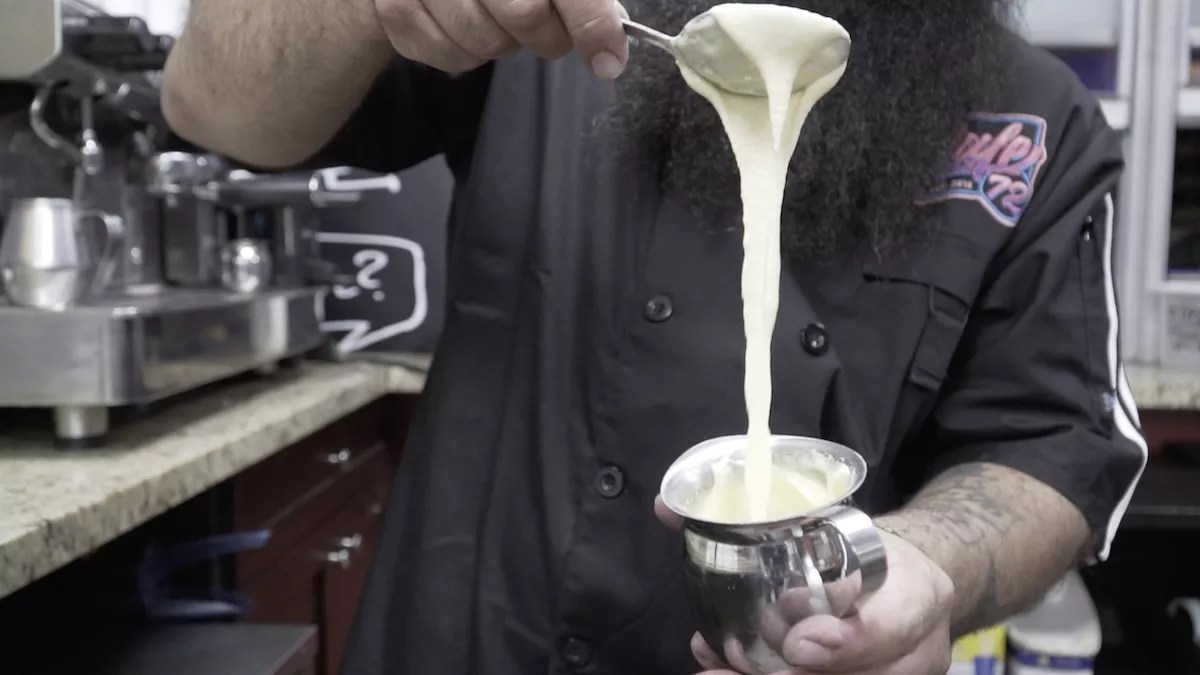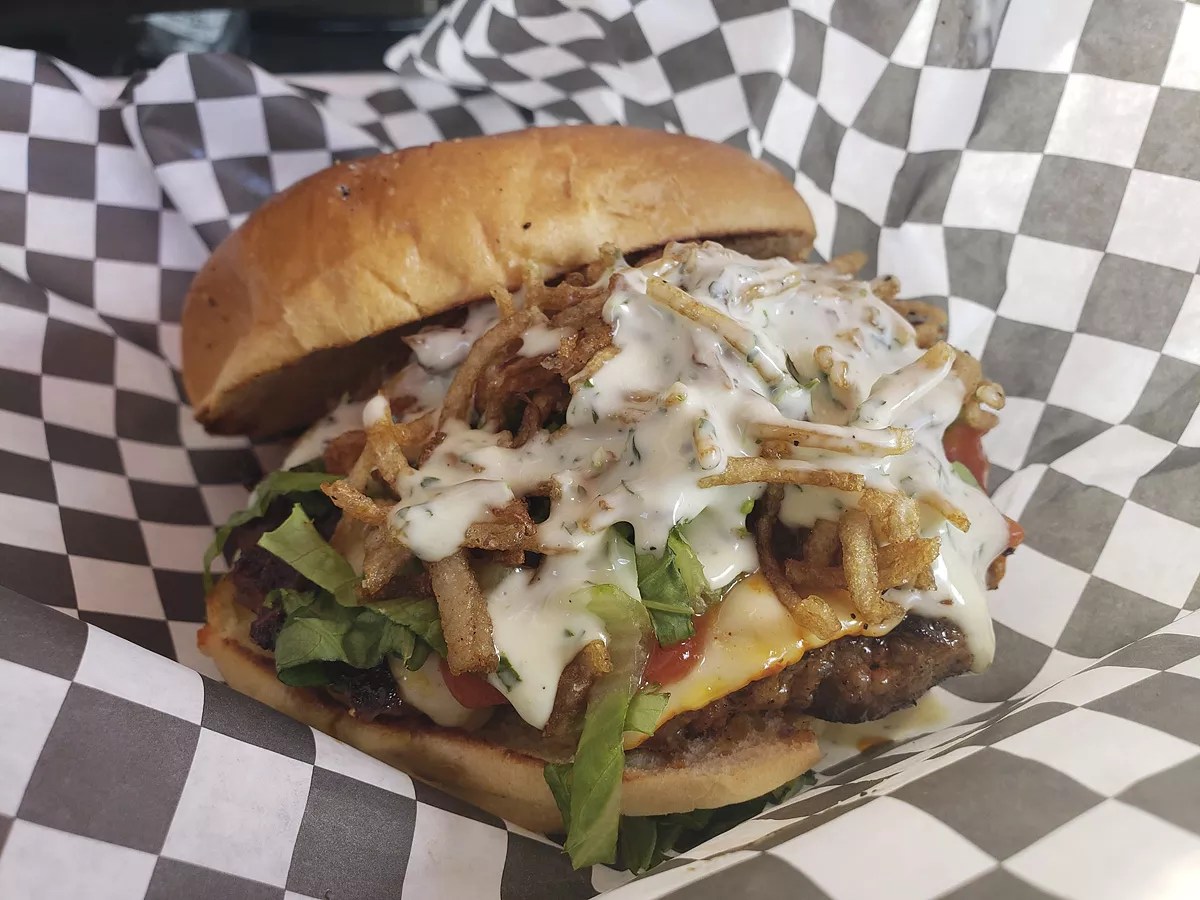
BST Films

Audio By Carbonatix
Frankie Zerquera never meant to become a cook. Once he did, he never thought he’d be best known for his dale huevo colada ($4.50), in which a raw egg yolk is magically incorporated into a stiff, sugary Cuban espresso. The resulting cup yields freakishly foamy sips of coffee with hints of the sweet richness of crème brûlée, a Chinese egg tart, or a well-made flan, all infused into the jet-black fuel that powers Miami through tourist season and the sweltering depths of summer.
“Everywhere I go now, I’m the fucking colada guy,” laughs Zerquera, who is 38 and bald with a black beard of nearly biblical proportion. “I spent the first half of my adult life trying to do music, trying to get famous, and nothing worked. Now, all of the sudden, I’m blowing up over a colada. It’s crazy.”
The springboard for it has been Café 72 (7201 NW 36th St., Miami; 305-593-0585; thecafe72.com), a mere window bordered by black paint and mismatched wood boards attached to a gas station across the street from Turner Guilford Knight Correctional Center. Looks can be deceiving, and despite it being nearly impossible to hear yourself think due to the constant stream of tractor-trailers roaring by, Zerquera’s spot serves far more than the cheap, stomach-stretching sustenance that many of the workers out in this part of town rely on to get them through the day.
The pan con bistec ($9) uses rib-eye, and the fatty shreds are topped with Muenster cheese, mojo-simmered onions, ketchup, mayonnaise, lettuce, and tomato. The original sandwich is in there, but occasionally hints of cheesesteak and even cold subs seem to peek out. The frita siete dos ($8) deploys a thick, smoky frita patty whose paprika-laced juices soak into a puffy, brioche-like bun and mingle with Muenster, cilantro aioli, and the crunch of fresh potato sticks. With each passing bite, you know the stomachache will be worse, but you don’t care.
“I like to take the simple Cuban dishes we all know, find the problems, correct them, and make them kind of Cuban-ish, kind of Miami-stoner-munchies food,” Zerquera explains. “Everything is big, everything is in your face, and you’re never going to leave hungry.”

Zerquera whips up a dale huevo colada.
BST Films
Young Cuban-American cooks are increasingly looking at the food they grew up with – the food that’s still widely available across Miami-Dade – and figuring out ways to improve it or make it stand out. You can find it just north of Miami International Airport, where Reuben Ruiz is cooking at Airport Cafe & Liquors. In Little Havana, you can find Lisetty Llampalla doing it at Doce Provisions. Yet for Zerquera, it wasn’t always guaranteed.
He was raised in Hialeah and “was just a Miami boy who grew up in the street eating shit.” His Cuban grandparents (the other pair was Italian) taught him how to cook, how to kill and clean chickens, how to prepare bacalao, and how to turn the offal and scraps that were all they could get in Cuba into delicious meals.
“When you ask a 12-year-old what he wants for his birthday dinner and he says cow tongue stew, that’s the kind of upbringing I had,” Zerquera says.
Zerquera’s spot serves far more than cheap, stomach-stretching sustenance.
Halfway through his freshman year of high school, he dropped out. His parents weren’t angry, but they told him he had to get a job. He washed cars at Hialeah’s Busy Bee Car Wash, did odd jobs for family, and twisted pretzels at Westland Mall. He soon noticed minimum wage wouldn’t cut it forever, but he couldn’t stand construction, so he got a job waiting tables at a now-closed Japanese restaurant in West Dade. It probably saved him.
“A lot of my friends got locked up really early,” he says. “My best friend got locked up when he was 16 and only got out five years ago.”
It wasn’t long before he found he was most comfortable in the kitchen and quickly moved up the ranks, working everything from the sushi bar to the hot line. The whole time, he was rapping with the group Sofla Kingz and selling CDs in front of the now-demolished CocoWalk in Coconut Grove. But with a young son and his girlfriend in a small apartment in Allapattah, Zerquera knew he needed to do more. He continued rapping, but he bounced around a few kitchens before ending up at a higher-end restaurant inside the Grand Miami in downtown.

Zerquera says his fare is “kind of Cuban-ish, kind of Miami-stoner-munchies food.”
Photo by Zachary Fagenson
“Everything I know about fine dining and kitchen skills I learned there,” he says.
Then, while working at midnight on New Year’s Eve 2008, he realized how much he missed his family and the normal schedule most people who don’t work in a kitchen take for granted.
“I walked out, then lied my way into a security job for Bardot, eventually became security manager, and then became manager of Gigi,” he says of the once-popular, now-closed bar and late-night Asian restaurant. That led to a gig with Gloria and Emilio Estefan’s company, but soon he felt the daily grind of corporate life whittling away at him.
“I’ve always been supercreative – I paint, I do graffiti, I rap, I cook,” Zerquera says. “For me, food was always the same kind of thing: It’s a foundation; it’s a contrast of colors, of tastes.”
He began looking to jump back into the kitchen, but on his own terms. He opened Boss Burger & Brew in Hialeah, which dishes out massive burgers and red velvet pancakes. Eventually, he sold his stake, and while he was consulting for what is now Cafe 72, he decided to buy into it.
The dale huevo colada that has become the place’s calling card was just waiting in the wings.
A few years before his Italian-born grandfather died, the family found a recipe book, and Zerquera immediately jumped on it. Tucked inside were the ingredients for a dessert/drink called zabaione made with egg yolks, sugar, and sweet wine or cognac whipped into a frothy frenzy. “As soon as I saw the recipe, I knew this would be badass in a colada,” he says. “It’s kind of like when you’re making a crème anglaise, only here the egg cooks because of the temperature of the coffee.”
In Capracotta in central Italy, from where the Italian side of his family hails, he says they call the dish “uovo sbattutto,” which roughly translates to “beaten egg.”
“When it comes to Cuban coffee, you want that espumita,” he emphasizes, “and what this does is turns the whole thing into a cup of espumita.” Only in Miami.